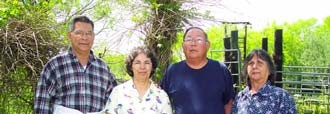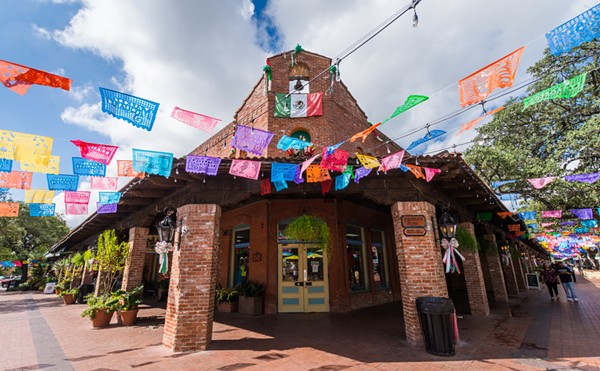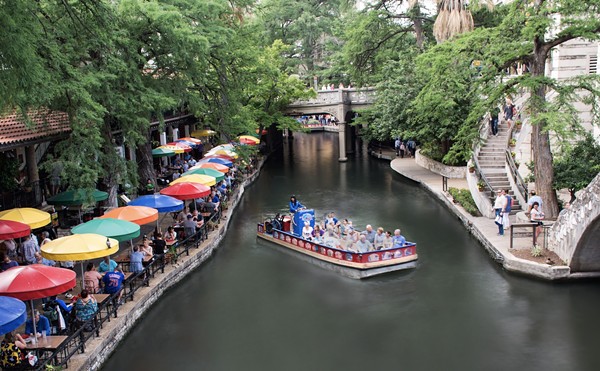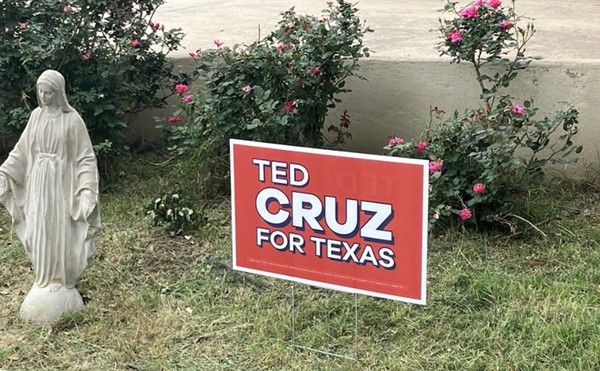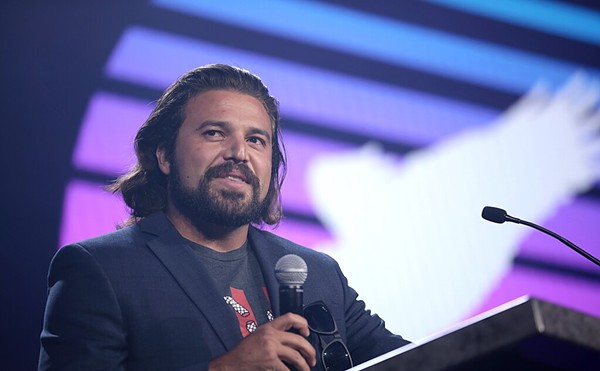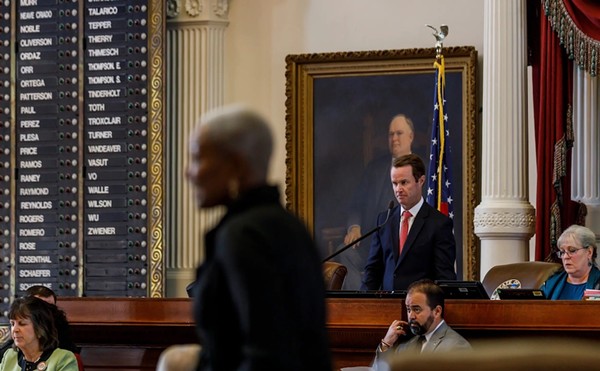The Chacón family's property values suffer from the Toyota buffer zone
At first glance, the animals huddled together in a City South sylvan glade, a cow pasture on the Chacón family farm, appeared to be a pack of dogs. But they were too closely clustered in the center of the field, and their heads were lowered as if they were grazing, but they weren't as tall as cows.
| The Chacón family's property values suffer from the Toyota buffer zone (Photo by Michael Cary) |
The hogs and other wildlife apparently moved to the Chacóns from the ranch that the City purchased to attract the Japanese auto firm Toyota to San Antonio.
"That's another problem," says Jesus Chacón, who says the feral hog population increased significantly after construction began nearby on the Toyota manufacturing plant. "There were at least 50 feral hogs in that pasture yesterday afternoon."
But the Chacón family, including Jesus and his wife, Emma, his brother Ernest, and Ernest's wife Theresa, say their problems began when Mayor Ed Garza established first a moratorium then strict regulations concerning their future use of the old Henry Rogers dairy farm they purchased in the early 1960s. The family's plan to use the property someday for subdivision development was their version of a 401k, which the mayor and Toyota have short-circuited by imposing a development buffer zone around the Toyota plant.
The Chacóns' situation is similar to their neighbors, the Bill Miller family, whose attempt to build 2,000 houses on 385 acres within the Toyota buffer zone was thwarted by Mayor Garza.
The Chacóns say they had platted more than half their land in one-acre lots for residential development, but now are restricted to a farm and ranch district or a mixed light industrial district. Property they might have sold for as much as $9,000 per acre only attracts offers of between $1,500 to $3,000 per acre.
The Chacón brothers were postal workers when they pooled their money and bought the farm in 1962. A couple of years later, they moved onto the property to farm cattle and raise their families. Today, Jesus is 71. Ernest, 66, recently had back surgery, and cannot even climb aboard his John Deere tractor. They fear if they don't continue raising cattle, they could lose their agricultural tax exemption, retroactive to five years, and would lose their property to a tax-foreclosure sale. They also used to grow hay and other crops, but feral hogs destroy crops and other vegetation, so the Chacón brothers did not plant this year.
| "... to see them turn a rural area into a large buffer zone and destroy the value of the land for landowners without just compensation is appalling." - the Chacón family |
"The city governments are allowing these giant companies, like Toyota, to fleece and control the American citizens," the Chacóns wrote in letters to Mayor Garza and other elected officials. "We understand the economic boost they bring to the cities. We welcome these companies because of the jobs they have to offer. But to see them turn a rural area into a large buffer zone and destroy the value of the land for landowners without just compensation is appalling."
San Antonio could compensate the Chacón family for what they consider a taking of the land, in that strict development controls have sharply decreased the value of properties adjacent to Toyota. The property can be sold for industrial use, which would not garner as much profit as subdividing the land for houses.
Although the Chacón farm is within the city's newly annexed boundaries, which the mayor has named City South, there has been no additional police or fire protection or garbage pickup. The Chacóns use septic systems for the two family homes and they pump their water from a well. The nearest sewer line runs down Applewhite Road to the Toyota plant.
"If they want to control us, they should compensate us," says Ernest Chacón. "We were here before Toyota."
The Chacóns complained to Toyota, but received a letter from Manuel Pelaez Prada, senior counsel to Toyota chief Tajima Hidehiko, denying their request for a meeting: "As such, we do not believe that scheduling a meeting at this time would be prudent. We learned from our experiences in other communities that this measure is necessary, to assure the practical, orderly and compatible development of neighboring land. This is very important to our goal to be a 'good neighbor.'"
Ben Pitman is selling 75 acres upstream on the Medina River. He confirms that wildlife has increased on his land, immediately downstream of the newly dedicated Medina River Park. Pitman invests in real estate and owns a mortgage company, and says he can command at least $6,000 per acre for his riverfront property. But he adds that the Chacón farm could bring in more than $3,000 per acre if the family were allowed to develop housing. "That is his (Ernest's) highest and best use, and almost overnight the City says you can't do anything. The City has taken away what he could do without remuneration."
District 4 Councilman Richard Perez, one of about five City officials to whom the Chacóns pled their case, says the family cannot develop houses, although it would be the most profitable way for the Chacóns to develop their property. Perez says the lack of sewer and water lines is a priority for developing properties along Jett Road.
As for the wild pigs? "Shoot them," Perez says. "No, I don't know if I can say 'shoot them.'"
Perez says he understands the destructive power of feral hogs, and suggests setting traps or finding another way to eradicate them, but he didn't offer any help from the City to address the dislocated wildlife from the Toyota property.
The City Council could soon defer development complaints or conflicts within a 63-square-mile area in City South. Last Thursday, Council voted unanimously, without discussion during the first of two public hearings, to establish a Defense Adjustment Management Authority, consisting of a 15-member board of directors, whose charge will be planning and zoning, levying taxes, issuing loans, and other duties within the boundaries of the DAMA.
The Legislature has already passed the DAMA Act as a way to boost local economies in areas where military bases have been closed or realigned. The local DAMA includes KellyUSA, Brooks Air Force Base, and City South.
This move puts more barriers between the Chacón family and City Hall, since any changes to their land use could be impacted by this new quasi-governmental entity.
"We're not against Toyota," says Jesus Chacón. "But they shouldn't expect all this for free. This is our lifetime investment." •
By Michael Cary

